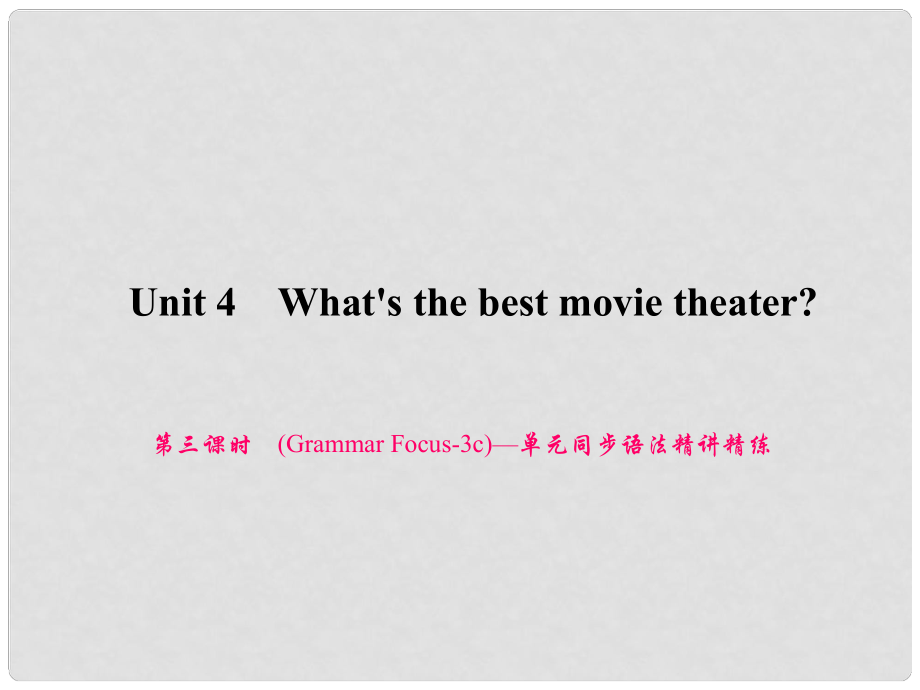《原八年級(jí)英語(yǔ)上冊(cè) Unit 4 What's the best movie theater(第3課時(shí))(Grammar Focus3c)同步語(yǔ)法精講精練課件 (新版)人教新目標(biāo)版》由會(huì)員分享�����,可在線閱讀��,更多相關(guān)《原八年級(jí)英語(yǔ)上冊(cè) Unit 4 What's the best movie theater(第3課時(shí))(Grammar Focus3c)同步語(yǔ)法精講精練課件 (新版)人教新目標(biāo)版(10頁(yè)珍藏版)》請(qǐng)?jiān)谘b配圖網(wǎng)上搜索�。
1、Unit 4Whats the best movie theater?第三課時(shí)(Grammar Focus3c)單元同步語(yǔ)法精講精練 形容詞最高級(jí)的含義形容詞的最高級(jí)用于三者或三者以上的人或物的比較�,表示“最”。形容詞最高級(jí)的構(gòu)成一般情況直接在單詞后加est�。eg:smallsmallest以不發(fā)音字母e結(jié)尾,其后加st���。eg:largelargest以“輔音字母y”結(jié)尾的詞�����,變y為i�����,再加est���。eg:earlyearliest以重讀閉音節(jié)結(jié)尾����,且詞尾只有一個(gè)輔音字母的形容詞�����,雙寫(xiě)這個(gè)輔音字母�,再加est。eg:bigbiggest多音節(jié)詞在其前加most����。eg:outgoingmost o
2、utgoing部分不規(guī)則形容詞的最高級(jí)��。eg:good/wellbest�����;bad/illworstmany/muchmost�����;littleleast形容詞最高級(jí)的句型用法“主語(yǔ)bethe形容詞最高級(jí)in/of范圍”表示“在某范圍內(nèi)最”�����?��!皁ne ofthe形容詞最高級(jí)可數(shù)名詞復(fù)數(shù)”表示“最的之一”��?�!皌he序數(shù)詞(除了first)形容詞最高級(jí)可數(shù)名詞單數(shù)”表示“第幾(大��,長(zhǎng)等)”���。eg:The Yellow River is the second longest river in China.黃河是中國(guó)的第二長(zhǎng)河。選擇疑問(wèn)句中���,常用句型:Which/Who.the形容詞最高級(jí)��,A��,B or C
3����、?【注意】形容詞最高級(jí)前通常要加定冠詞the��。但前面若有物主代詞、指示代詞或名詞所有格等修飾時(shí)�,不能用定冠詞the。形容詞最高級(jí)常與介詞in或of引導(dǎo)的短語(yǔ)連用���,與in連用意為“在內(nèi)”����,表示“在某范圍內(nèi)”����,不一定是同類;與of連用表示“屬性”��,介詞后的名詞或代詞與句中的主語(yǔ)是同一類人或物��,意為“在某一類中”���。 一、根據(jù)句意���,用括號(hào)中所給單詞的適當(dāng)形式填空���。1Lin Tao jumps _ (high) in our class.2Which is _ (big)�����,the sun�,the moon or the earth?3David is the _(popular) player in t
4��、he soccer club.He plays the _ (well)4There are three farms in the village.Joes farm is very _Toms farm is a little _ than Joes.Marks farm is the _ of all.(big)the highest the biggest most popular bestbigbiggerbiggest二��、單項(xiàng)選擇�。5Linda is one of _ _ students in our class.Agood BbetterCbest Dthe best6What
5、a nice watch it is!Yes�����,its _ _ one of all.Aexpensive Bmore expensiveCthe most expensive Dthe expensive7It wasnt _ _ game�,but at least we won!Athe most interesting Bmore interestingCinteresting Dmost interestingDCA8Who listens to the teacher _ _ in class,Tom����,Jack or Bill?Bill.Acarefully Bmore careful
6、lyCless carefully Dthe most carefullyD本課時(shí)其他知識(shí)點(diǎn)精講精練worse“更差�;更壞;更糟”�����,是bad和badly的比較級(jí)形式。service名詞���,意為“服務(wù)��;接待”�����。其動(dòng)詞形式為serve���,意為“為服務(wù)”。act動(dòng)詞��,意為“扮演”����。其名詞形式為actor,意為“男演員”�����?��!就卣埂縜ctress女演員1Do you want to _ (表演) at the school party�����,Helen?2I care more about the _ (服務(wù)) than the food in a restaurant.3Your work is _ good���,
7、but it could be better!actservicepretty4Could you please show me the _�?I want to order some food.5People in China usually have three _ a day.6How are you feeling today?Im feeling much _ (bad) than yesterday.7Its about_15_minutes_walk_ from here to school.(對(duì)畫(huà)線部分提問(wèn))_ from here to school?menumealsworseHow far is it
 原八年級(jí)英語(yǔ)上冊(cè) Unit 4 What's the best movie theater(第3課時(shí))(Grammar Focus3c)同步語(yǔ)法精講精練課件 (新版)人教新目標(biāo)版
原八年級(jí)英語(yǔ)上冊(cè) Unit 4 What's the best movie theater(第3課時(shí))(Grammar Focus3c)同步語(yǔ)法精講精練課件 (新版)人教新目標(biāo)版

